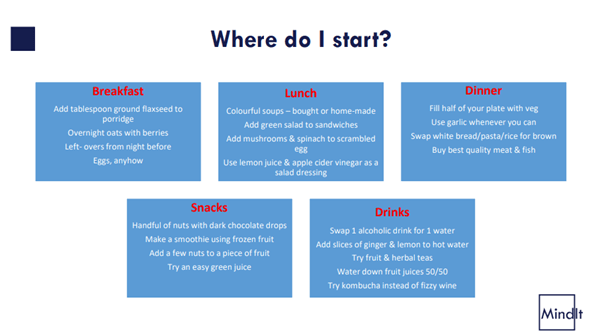From vital vitamins to the importance of your beauty sleep, we speak to an expert about why taking care of immune health is so important
“Please wash your hands” is a phrase we’ve all become very accustomed to over the past two years. Sanitiser is now a handbag essential and the COVID-19 pandemic has prompted us to become a lot more conscious about the transmission of germs across our day-to-day lives.
We spoke with Nutritional Therapist, Jenny Thewlis, to share her expert knowledge and help us understand more about the immune system. Having led our recent wellbeing webinar on immune health, Jenny has a host of tips and tricks on how you can boost your natural defences as you head into the new year. Interested? Read on…
Why is your immune system so important?
According to the Institute for Quality and Efficiency in Health Care, the immune system “protects your body from harmful substances, germs and cell changes that could make you ill… As long as your immune system is running smoothly, you don’t notice that it’s there. But if it stops working properly – because it’s weak or can’t fight particularly aggressive germs – you get ill”.
In a nutshell, your immune system plays a vital role in helping you to fight illness. It’s worth taking care of!
What can you do to naturally boost your immune system?
‘Immune boosting’ has become a trendy phrase during the pandemic as people look for new ways to reduce the risk of falling ill. However, it’s important to remember that there is no magic fix that will boost your immune system overnight.
When it comes to your health, steady yet attainable improvements can make a significant difference. Harvard Medical School says that “following general good-health guidelines is the single best step you can take towards naturally keeping your immune system working properly”. With that in mind, let’s turn to Jenny for six simple adjustments you can make in your everyday life:
- Get the right nutrients from your food
A well-balanced diet is beneficial for many health-related reasons and the immune system is no exception! While many people like to take supplementary vitamins to ensure they’re getting the correct nutrients, you can actually get most of the nutrients you need from fresh produce in your diet.
Vitamins A, C, E, zinc and selenium are all powerful antioxidants that help fight infection in the body. They’re found in a variety of foods including cheese and milk (vitamin A), citrus fruit (vitamin C), plant oils (vitamin E), red meat and lentils (zinc), and brazil nuts (selenium). Vitamin B6 is also essential for the immune system and can be obtained through popular items like bananas and tuna. Vitamin D is one nutrient that many people struggle to get enough of, particularly in winter when there’s often not enough sunlight for your body to produce it naturally, but it’s an important one to remember (try fatty fish!).
You can also incorporate some useful herbs and spices into your diet. Ginger, garlic and turmeric can have anti-inflammatory, antimicrobial and antifungal properties.
Finally, try to reduce eating processed food, stay hydrated and be aware of your alcohol and caffeine intake.

- Excellent exercise
As well as helping you to sleep better and reduce feelings of stress, exercise can positively impact the immune system. The Journal of Sport and Health Science highlights that “the immune system is very responsive to exercise.”
Exercise helps to boost defence in membranes and white blood cells and can also reduce stress hormones. Try to engage in some kind of exercise every day – even a brisk 15-minute walk is great for you!
Why not try out some of our online workout classes, like HIIT and PIYO or chair yoga? We also have a running club that meets every Friday.

- Get some beauty sleep
When you’re sleeping, your immune system produces and releases proteins called cytokines. These cytokines target infection and inflammation and play a crucial role in defending your body.As advised by the NHS, most adults should aim for eight hours of sleep each night. Of course, some people will need more, while others won’t need as many. It’s all too easy to stay up watching another episode of your favourite series, but try to view sleep as a necessity rather than a luxury (Netflix can always wait!).
We have a useful bog outline tips on how to get a better night’s sleep, you can check it out here.
- Practise mindfulness
At times, work and personal issues can build up and threaten to impact our emotional wellbeing. But, the ability to manage our fluctuating stress levels also has benefits for our immune system.
In a 2016 study, the National Library of Medicine found that mindfulness meditation may reduce markers of inflammation, which can be linked to a weakened immune system and illness. If you feel stress might be starting to overwhelm you, try taking time out to read, enjoy a bath, walk, practice yoga, meditate – whatever helps you feel more relaxed. Even simple deep breathing exercises can work wonders.

- Focus on your gut
Your gut is a lot cleverer than you might think! It can tell a lot about your health long before you know it yourself. Surprisingly, the immune system is very closely connected with the bacteria in your gut. The gut helps to influence the strength and development of your immune system. Looking after your gut always comes back to diet. Feed that friendly gut bacteria by eating prebiotic fibres such as fruit, veggies, natural yoghurt, sourdough bread, pickled veg, and fermented products like soy sauce and apple cider vinegar.
- Good personal hygiene
This is something we should all be very used to by now. Washing your hands thoroughly is important in stopping the spread of viruses and bacteria, especially after coughing, sneezing, eating food or using the loo. You should use soap, water and wash for at least 20 seconds – get singing ‘Happy Birthday’!
Why am I still getting poorly when I have a strong immune system?
Even a tip-top immune system won’t defend you from all colds and flu – it’s completely natural to get sick from time to time.
However, maintaining a strong immune system can help you to recover from colds and the flu that little bit more quickly!
Thank you to Jenny for taking part in this blog post. If you’d like to join our next free wellbeing webinar on the science of happy hormones, click here.


